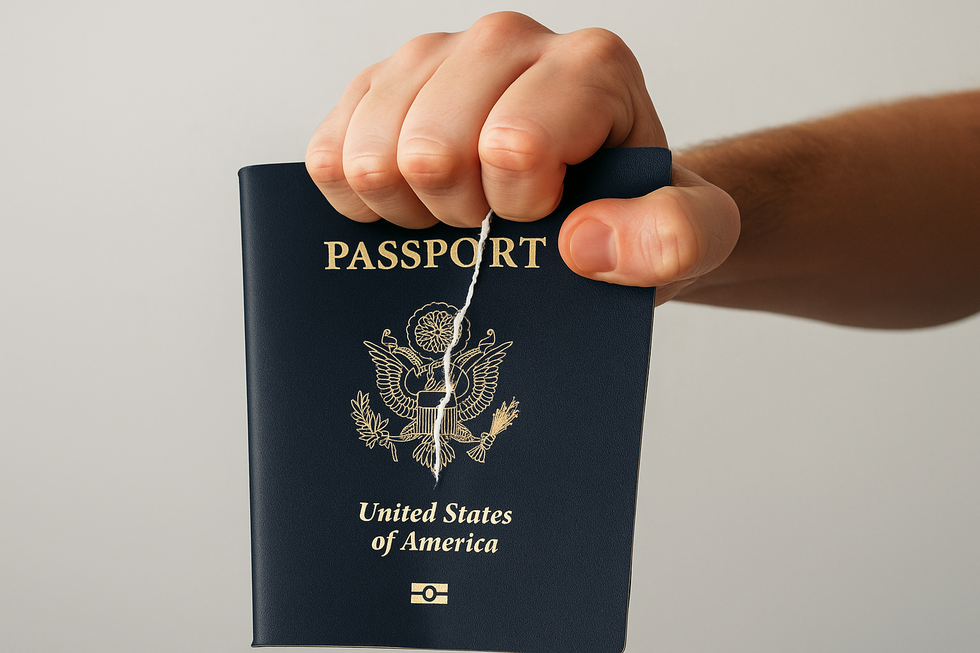Acceptable reasons for renouncing US citizenship: what it means and what happens next

When many Americans face a problem they can’t solve, renunciation sometimes comes to mind. But most people don’t know that giving up US citizenship is a serious and final choice. It must be done in another country, in front of a consular officer. Once it’s done, there is no going back.
Renouncing US citizenship can make sense for people living overseas or dealing with local laws that don’t match US rules. But it also brings big legal and tax effects. There is a $2,350 fee, and in 2025, the limits include $206,000 in average income tax and an $890,000 gain exclusion.
After renunciation, travel rules change. You also must file Form 8854 and may owe an exit tax under section 877A.
This article is brought to you by Taxes for Expats – your trusted partner for clear, confident cross-border tax help. We walk you through every detail of renunciation, calculate your exit tax, and prepare filings that meet State and IRS standards. Learn more about our services or contact us today.
Why do people choose to renounce their US citizenship
Unless you’ve lived it, it’s hard to grasp why anyone would give up citizenship in a country so many fight to gain. For an American who’s built their life in Madrid, for instance, it can be a matter of belonging – alluding to the fact that acceptable reasons for renunciation stem from personal autonomy rather than avoiding legal duties. For many, it’s a reflection of how their work, family, finances, and values have become deeply rooted abroad.
Permanent life abroad and stronger ties to another country
Years spent overseas can make daily life, family, and community rooted elsewhere. When work, schools, and healthcare are all outside the United States, American citizenship may feel less relevant. For some, renunciation simply aligns status with reality.
Dual citizenship limitations and employment restrictions
For many people, the choice to renounce US citizenship begins when their country of residence limits dual nationality. Some governments require exclusive allegiance for public service or national security roles. What starts as a matter of compliance can quickly become a life-changing decision about identity and opportunity.
Imagine an American who moves to Australia and wants a top job in the military or government. These jobs often require only Australian citizenship, and people with two citizenship may not qualify for certain clearances. Japan also asks people with two citizenship to choose one – usually by age 22. Other countries have similar rules to protect national loyalty or make the law easier to follow.
Sometimes, jobs are not the reason at all. Countries like Singapore, India, and Austria do not allow dual citizenship. So, people from those countries who become citizens somewhere else must choose which nationality to keep. For Americans living overseas for many years, this kind of law can make renunciation a practical and sensible choice.
Complex US tax and reporting burdens
In Cook v. Tait, the Supreme Court upheld taxing citizens on worldwide income even when they live abroad, a principle that still shapes compliance today. For some, the time and cost of forms and audits in the following make renouncing your citizenship feel like the cleaner path.
- Anyone with foreign bank accounts worth more than $10,000 at any time in the year must file an FBAR. Each account has to be listed, even if it earns no income.
- The FATCA Form 8938 adds another report for people whose accounts pass certain limits. It often repeats the same details as the FBAR, but goes to a different agency with its own rules.
- Forgetting or filing late can bring a fine of $10,000, and if delays continue, extra penalties can reach $50,000. Willful mistakes can cost even more.
- The Streamlined Filing Procedures, meant to help those behind on filings, ask for six years of bank reports and three years of tax returns, plus a written explanation, which, to many, can feel endless and stressful.
Political or ideological reasons
Some people feel that their country is moving in a direction they don’t agree with, and they want their legal status to match how they live and feel. In recent years, changes in the United States have made those feelings stronger for some Americans living overseas.
The number of people who give up citizenship is still small in a country with over 300 million people. But in early 2025, about 1,285 names were listed in the first quarter and 1,057 in the second. That means around 2,300 people finished the process in the first half of the year. These numbers show how many citizens and long-term residents have chosen to leave their US citizenship behind.
Simplifying Financial and Legal Life
Many want clean banking, straightforward estate plans, and fewer cross-border filings. Renunciation can reduce duplicate paperwork, mismatched rules, and account friction in some countries. The decision is still serious and should be weighed against travel, benefits, and tax consequences.
- Bank onboarding can ease when FATCA and FBAR no longer apply after expatriation.
- Estate planning may simplify where local law conflicts with US worldwide-tax reach.

Renunciation reasons that could lead to legal trouble
There are good reasons for renouncing US citizenship, but some choices can cause serious problems. The State Department is clear: giving up citizenship will not let anyone escape punishment or debts under US law. This guide does not help people hide their reasons, because lying about intent can lead to real legal and immigration trouble.
If someone renounces to avoid paying taxes or prosecution, it can go very wrong. People who give up citizenship just to avoid taxes can be denied entry to the United States under the Reed Amendment (8 U.S.C. 1182(a)(10)(E)). Criminal cases can still be enforced, and people can be returned to face charges.
Renouncing without fully understanding the process or under pressure is also a problem. The officer must see that you are acting freely and know what it means. That’s why Form DS-4081 asks you to confirm that no one is forcing or pressuring you.
Trying to keep US rights after renouncing can lead to trouble, too. Once you take the oath, you are treated as a foreign national and cannot use US travel or benefit privileges anymore.
NOTE! Renouncing citizenship does not erase old tax debts. A special expatriation tax may still apply, and border officers can question your intent if they think you renounced to avoid taxes.
Also read. IRS relief for former citizens
What does the renunciation process involve
Renunciation happens in person with a US consular officer abroad, and it changes legal status and daily life, so it deserves calm planning. It also touches travel, fees, and documents that prove the end of US citizenship.
Step 1: Book an appointment at a US embassy or consulate to renounce your citizenship, since the oath is taken abroad and at least one interview is in person.
Step 2: Complete and review DS 4079, DS 4080, and DS 4081 with the officer, who confirms you understand the consequences under INA 349a5. This paperwork records that renouncing citizenship is voluntary and informed.
Step 3: Pay the $2,350 administrative fee before the oath, then keep proof of payment for your records. This payment is required prior to renouncing your citizenship.
Step 4: Attend the interview where the oath is administered and signatures are taken, then wait for the State to issue the Certificate of Loss of Nationality by mail. This is the formal end of your renunciation and marks the close of your ties under US citizenship.

Tax and financial implications after renouncing
Many expats face the same situation where they believe everything would end once they took the oath of renunciation, but soon learned that letting go of US citizenship was more than handing over a passport – it changes how every part of your financial life works.
- For many, renouncing citizenship, covered expatriate status can apply when the 5-year average income tax exceeds $206,000 for 2025, net worth hits $2,000,000, or compliance can’t be certified. The exit tax marks most assets to market with an $890,000 gain exclusion, and certain deferred compensation requires Form W-8CE notices.
- You file it in the year you renounce your citizenship to certify five clean years and to set covered expatriate status. It ties to your year-of-expatriation filing, and missing it can trigger penalties and confusion later.
- After ending US citizenship, Social Security can continue abroad, but country rules and reporting matter; Medicare coverage outside the US is very limited. Dividends and similar income from US sources are typically withheld at 30 percent for nonresidents unless a treaty reduces the rate, so update broker forms and payout instructions.
- If you’re renouncing your citizenship and later make gifts or leave assets as a covered expatriate, the US recipient may owe tax at the highest estate tax rate under section 2801, reported on Form 708. Protective and coordinating rules now apply under final regulations effective January 1, 2025.
Practical living impact after renunciation
Letting go of US citizenship can feel like ending a big part of your life. Every trip and passport stamp once showed where you belonged, but now it’s about visas and new borders. Home starts to feel different.
When you renounce your citizenship, it means more than losing the right to vote or get help from the government. It means seeing yourself in a new way – as someone living outside the country that helped shape who you are.
For many people, this change brings peace. It can mean freedom from double taxation, easier money rules while living overseas, and a calm feeling when your home, life, and loyalty all fit together. These are some of the benefits of renouncing your American citizenship beyond the papers you sign.
Clear alternatives to full renunciation
Many with American citizenship hesitate before taking an irreversible step. Try these measured paths that ease taxes and paperwork while you decide what comes next.
Using tax treaties or IRS streamlined procedures
Bilateral tax treaties can help clarify residency and prevent double taxation, while the IRS Streamlined Foreign Offshore Procedures offer a path to catch up on past filings without harsh penalties. These routes help people abroad stay compliant and often resolve complex tax issues without ending citizenship altogether.
Consulting with tax attorneys for compliance help
Expert advice ensures you meet all filing thresholds – such as FATCA Form 8938 or FBAR – and avoid costly mistakes. A tax attorney or expat tax specialist can help plan timing, reduce liabilities, and guide you confidently before you decide to renounce your citizenship.
Maintaining dual citizenship strategically
Keeping both passports can preserve mobility and access to family, property, or benefits in more than one country. US law permits dual nationality, but some countries restrict it, so confirming your host nation’s rules is key before making any changes.
Get expert help before renouncing your US citizenship
Renouncing citizenship is a serious and final decision. Our specialists can help you – whether you’ve chosen to move forward or are still on the fence. If the tax burden is your main reason for considering renunciation, we offer several services designed to simplify compliance and relieve financial pressure.
- Catch-up filings through IRS delinquent tax relief programs
- Annual expat tax return preparation and filing
- FATCA Form 8938 reporting
- FBAR preparation and e-filing
At Taxes for Expats, we have mastered the complexities of global tax compliance, guiding clients through the financial side of renouncing US citizenship and life beyond it.

FAQ
You may face an exit tax at expatriation, and afterward, you are taxed as a nonresident on US-source income and certain deferred accounts.
Renunciation is meant to be permanent, and regaining American citizenship generally means qualifying again and naturalizing like any other applicant.
Your property stays yours, but future income may be subject to withholding and you file as a nonresident on US-source income.
It can simplify life abroad and cut compliance stress, yet the tradeoffs include possible exit tax, travel limits, and the loss of civic ties.



